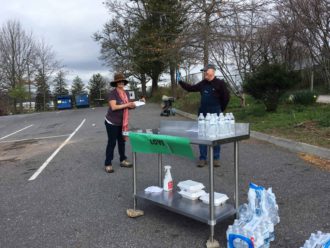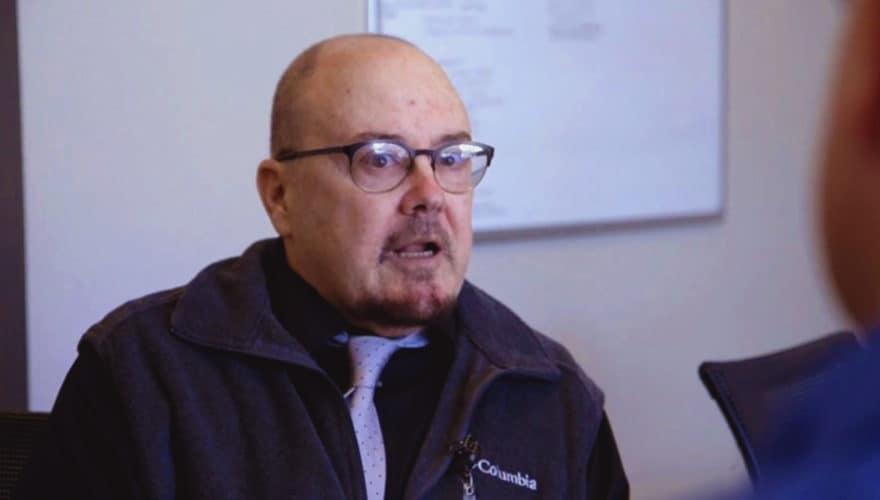By Liora Engel-Smith, North Carolina Health News
When coronavirus transformed North Carolina’s telehealth billing in early spring, Kevin Mahoney began checking in with most of his 200 clients via video and phone. But the Asheville-based peer support specialist soon discovered that telehealth left some of his clients behind.
Mahoney, who works at the Mountain Area Health Education Center, supports people seeking recovery from drug and alcohol use. But it can be a challenge. Often, his homeless clients don’t have a working phone and some of his rural clients live in areas with spotty cell reception and little to no internet access.
In the five months since North Carolina’s first known coronavirus case, efforts to curb the spread of the new disease have also fostered conditions that can exacerbate mental illness. Anxiety and depression are on the rise amid the uncertainties of the outbreak. Overdoses, too, have spiked, according to Victor Armstrong, who heads the state Division of Mental Health, Developmental Disabilities and Substance Abuse Services.
And in a survey conducted by the North Carolina Academy of Family Physicians and the North Carolina Pediatric Society in early May, nearly half of physicians said that the demand for mental health services is significantly higher now than it was in March.
Social connections can be an important coping tool for people with mental health needs, but exactly how to deliver that support without spreading the virus has been a challenge in rural areas, where the broadband infrastructure is limited.
“With the pandemic, there was so much focus on social distancing and the shutdown that people were really more focused on the medical aspects of the virus,” said Stephen Buie, who heads MAHEC’s department of psychiatry. “Now that it’s becoming a longer-term problem, people are starting to think about how does this affect people who are isolated, people who have to live by themselves and people who don’t have much social support.”
Across western North Carolina, mental health providers have explored creative ways to connect vulnerable people who lack technology access with services, from giving them free smartphones and data plans to holding support group meetings outside.
A virtual lifeline
When the lockdown was in full force in early spring, two mental health agencies in the western part of the state began experimenting with ways to connect patients to services. Their experience was similar to Mahoney’s: Most, but not all patients had access to a computer or phone for telehealth visits.
The two agencies — Vaya Health and Partners Behavioral Health Management — identified patients who couldn’t connect virtually and gave them free smartphones with data plans. Vaya and Partners connected a collective 1,000 patients to the internet with these independent programs. The goal is to keep people with complex mental health needs out of the hospital.
“The barrier was the technology and the data plan,” said Lynne Grey, clinical director for mental health and substance use at Partners, an organization that serves a nine-county region. “Because it takes a lot of data on a cellphone.”
Both agencies got free phones from Verizon but had to purchase data. Partners elected to provide unlimited data to patients and the company gave a discount; nonetheless, the cost was a limitation. Vaya ended up budgeting 2 gigabytes per phone per month.
The free cell phones don’t erase connectivity issues completely. Grey said that some rural patients have to make use of public Wi-Fi because they don’t have reception in their home. On top of that, the agency cannot replace a lost or stolen smartphone.
Distributing smartphones and teaching clients to use them can also be logistically complicated, she said.
Neither agency has data on cost savings or outcomes for participating members, but representatives from both organizations said patients are using more resources, including virtual groups and therapy. They’re betting that connecting people with complex mental health needs to their provider will result in fewer hospitalizations and emergency department visits in the long run.
The cost-saving of that approach could be significant. The average Verizon plan costs roughly $420 to $660 per year without corporate discounts. But a single mental health emergency room visit costs anywhere from $570 to $640 per visit. That cost can balloon beyond that figure if patients are admitted to a hospital.
Grey said that patients report the phones help them curb the loneliness associated with an extended stay at home, improving their overall well-being.
“We found that people are just thrilled and that the phone changed their lives,” said Allison Crotty, member engagement director at Partners. “Not only is it helping them engage in services, but they’re also able to listen to music that’s calming and they’re able to maintain social networks.”
Open-air support

Mahoney, the peer support specialist, has gotten good at fostering closeness even when clients aren’t physically in the room with him. But when screens aren’t an option, Mahoney meets with people face-to-face. Twice a week, he visits the Haywood Street Congregation, an Asheville church that serves takeout meals to the homeless.
Mahoney said he wears two masks and sanitizes his hands frequently when he’s seeing clients in person. He sits across from people at a picnic table, offering support and the occasional elbow bump. And he reminds clients to wear masks during those interactions to minimize the risk of transmission.
Every so often, Mahoney also drives out of Asheville and into the surrounding mountains to visit rural clients who cannot connect in any other way.
“I’ll go sit on their front porch or sit on their steps six feet away and check in that way,” he said.
Elsewhere in the mountains, Mary Ann Widenhouse, president of the Haywood County chapter of the National Alliance on Mental Illness, has tried to hold a support group outside. Many of the members, she said, prefer face-to-face interactions to phone conversations and the chapter has yet to venture into virtual support.
The idea of an outdoor group seemed simple at first: pick a public park and a time and invite mask-clad members. Everyone would sit six feet apart to minimize exposure. But the inaugural open-air group, held last month at a park in the town of Waynesville, ran into challenges.
On the night of the meeting, children played soccer nearby and their moms were chatting in the shaded shelter that Widenhouse intended to use, so there wasn’t much privacy. Other questions quickly arose too: How many people should be allowed to attend the group at once? Should Widenhouse screen participants for symptoms ahead of the meeting? And what outdoor locations could guarantee privacy in the future?
Widenhouse’s experiment appears to be unique among NAMI chapters, said Mikayla Cardona, affiliate and outreach specialist at NAMI North Carolina. The sweltering North Carolina summer has limited the usefulness of that approach, but the organization may revisit the idea when the weather cools down. In the meantime, several chapters are holding online support groups, she added.
Widenhouse said the outdoor group idea needs refining before the next meeting. Lately, she’s been thinking that perhaps a hiking support group could offer the privacy members need. But what works in Haywood County may not work for another community, she said.
Whatever kinds of support a community chooses, Mahoney said, be it face-to-face or virtual, would be important to sustain in the coming months.
“We’ve got the opioid epidemic and it hasn’t gone away and the other things haven’t gone away, but we’re in the middle of a pandemic,” he said. “It’s like a tornado in the middle of a hurricane.”
North Carolina Health News is an independent, nonpartisan, not-for-profit, statewide news organization dedicated to covering all things health care in North Carolina. Visit NCHN at www.northcarolinahealthnews.org.
This article first appeared on North Carolina Health News and is republished here under a Creative Commons license.




Before you comment
The comments section is here to provide a platform for civil dialogue on the issues we face together as a local community. Xpress is committed to offering this platform for all voices, but when the tone of the discussion gets nasty or strays off topic, we believe many people choose not to participate. Xpress editors are determined to moderate comments to ensure a constructive interchange is maintained. All comments judged not to be in keeping with the spirit of civil discourse will be removed and repeat violators will be banned. See here for our terms of service. Thank you for being part of this effort to promote respectful discussion.